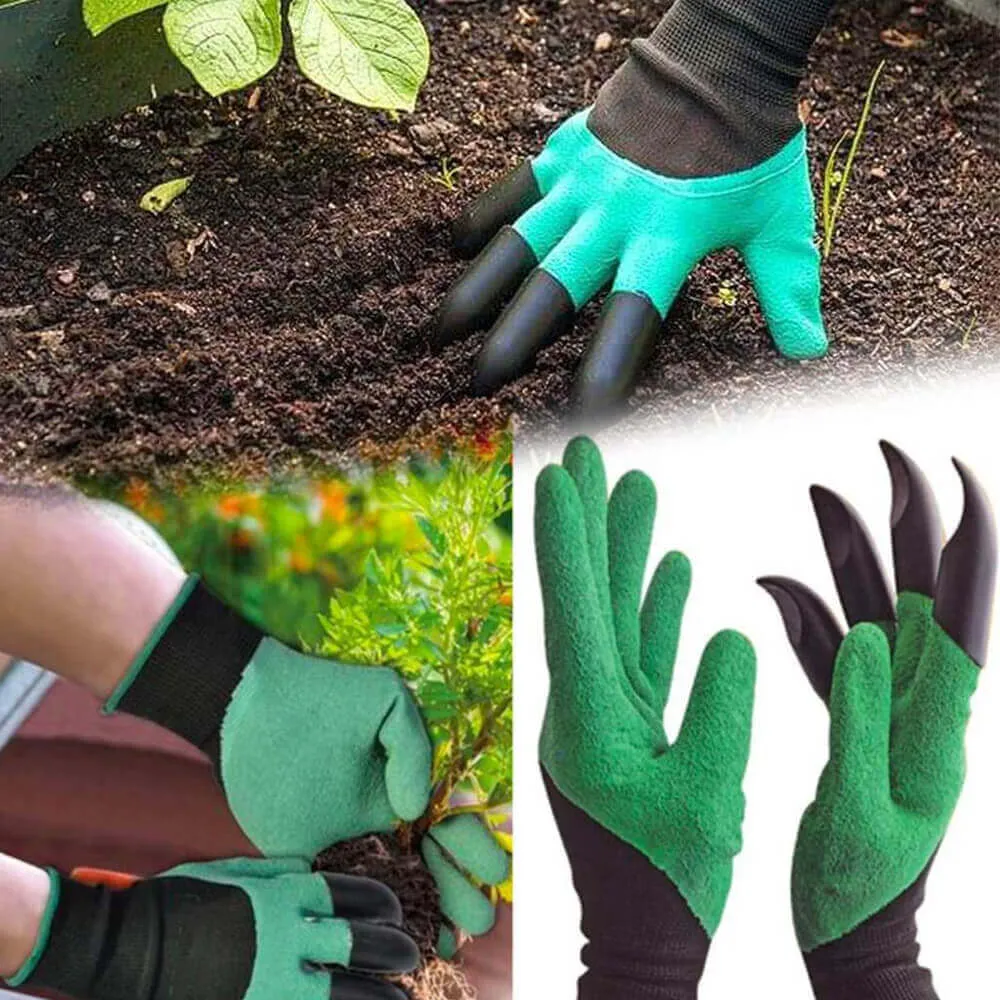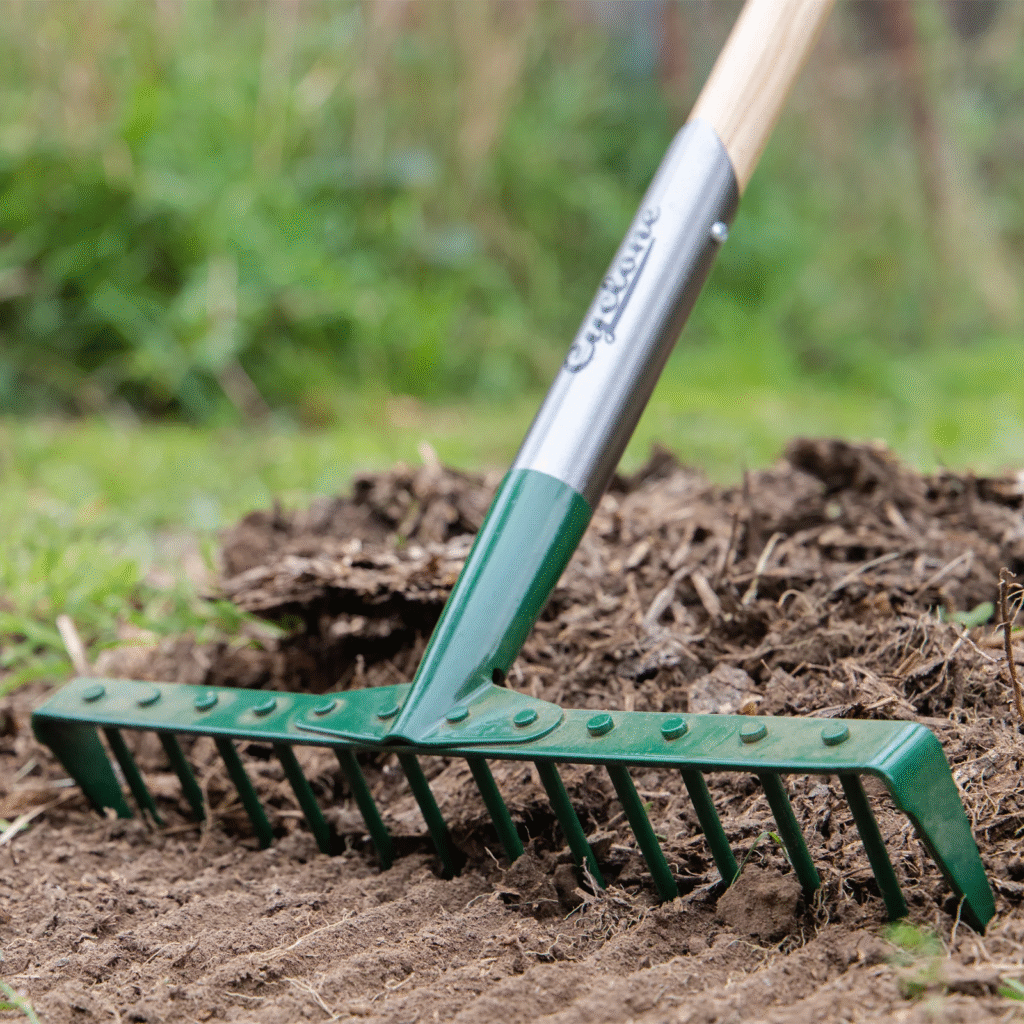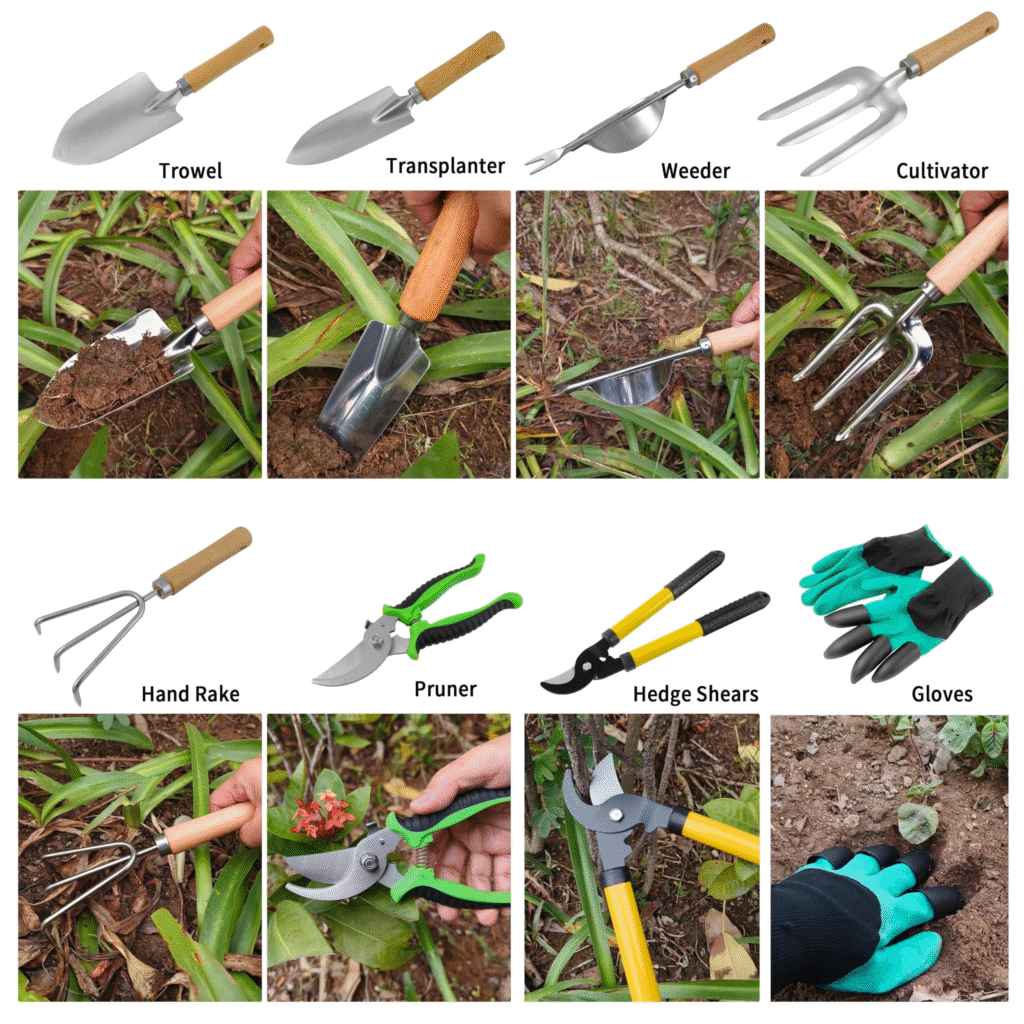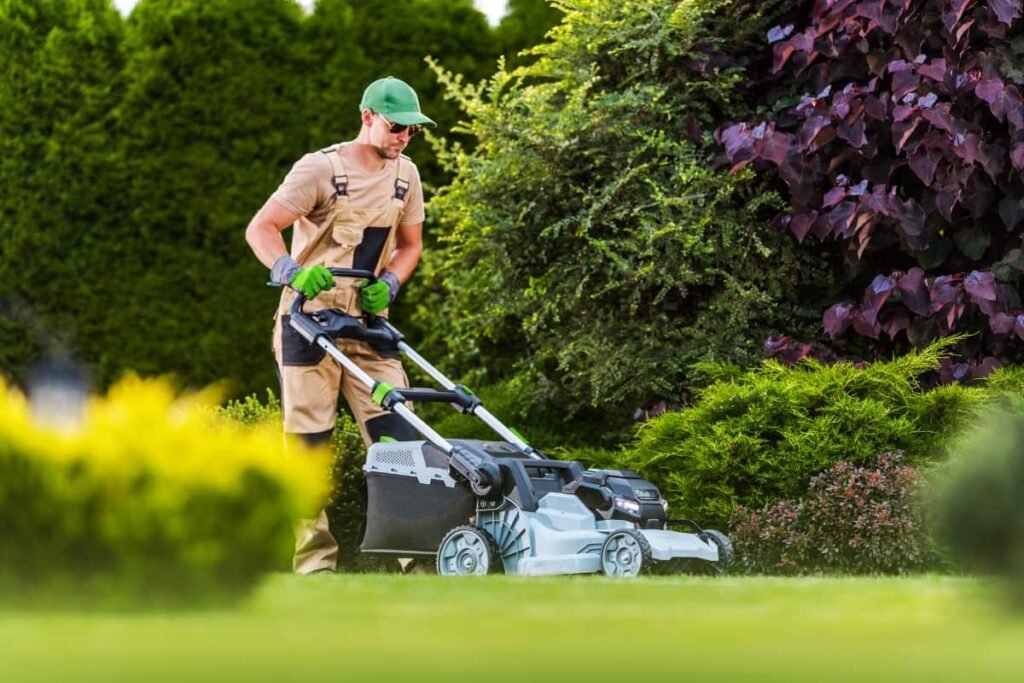The basic tools that every gardener—beginner or advanced—needs in their shed.

It’s easy to go overboard when purchasing landscaping tools. They can take up a lot space and cost a lot of money, but staying focused on the basics can keep your shed or storage area from becoming overcrowded. There’s always bigger and better, but buying the best quality tools that your budget will allow, and maintaining them, can go a long way in getting the most out of your investment.
Here are 9 essential garden tools to get you going on any garden project you have in mind:
1. Gloves

While gardening can be a wonderful hobby, it can quickly turn into a thorny and splintery hassle without the right pair of gloves.
- Gloves should be durable but not too bulky, especially for working with seeds or transplanting seedlings.
- Fit is important, as poorly fitting gloves can cause blisters or result in accidents from slipping off.
- Fabrics that are water resistant, but also breathable, will help keep hands cool and comfortable.
- Longer cuffs protect wrists and forearms from scratches and keep soil from getting in.
- Store gloves out of sunlight, away from water and safe from insects.
- Botanical photographer, Ellen Hoverkamp recommends Foxgloves. They are made of high-tech sport fabric that is water resistant, breathable, and provide a form fit that has been described as a ‘second skin’.
2. Pruning Shears

Hand pruners, also called secateurs, help reign in plants that are getting out of control and taking over. Anvil-style pruners cut with a sharp blade meeting a flat surface, similar to a knife on a board. Bypass pruners cut with a sharp blade passing by a sharp-edged flat surface, more like sci are best for live plants and green wood.
- Anvil Pruners are better for dead wood and can cause crush injuries to fresh, green stems and branches.
- Pruners should fit easily in the palm of your hand.
- Ratcheting pruners provide increased cutting strength, perfect for anyone with reduced hand strength or arthritis.
- For cleaner cuts and less injury to plants, pruners should be sharpened regularly.
Hovercamp also recommends ratcheting pruners for increased strength to cut through thicker or harder branches easie
3. Loppers

- Another cutting tool, loppers are basically long-handled pruners used to trim hard to reach areas and cut thicker branches. The long handles provide the leverage it takes to cut through branches up to an inch or more in diameter. There are anvil and bypass types, just like pruners. Handles generally range from 16 to 36 inches.
- Bypass loppers are more precise in cut location than anvil style.Longer handled loppers can be heavy. Know what you’ll be cutting and how far you’ll need to reach and get the appropriate length.Lightweight aluminum or carbon-composite handles can be lighter.Like pruners, keep lopper blades in good condition and sharpen regularly.
For a lightweight, but durable option, our editors recommend Woodland Tools Compact Duralight™ lopper. The gear-amplified cutting power, high-carbon steel blades, and ergonomic U-Shape™ handles make for comfortable, efficient pruning.
4. Garden Fork
An efficient tool for turning soil, garden forks can dig into dense soil better than a spade.
- Forks with a slight curve to the spines are useful for scooping mulch or turning compost piles, much like a pitchfork.
- Straight tines are better for digging; great for compacted, rocky, or clay soil.
- Square tines are stronger than flat tines which can bend when they hit a rock or root.
Landscape designer Genevieve Schmidt recommends the Radius Garden 203 Pro Ergonomic Steel Digging Fork. The stainless steel, square tines resist rusting and the ergonomic handle has a non-slip grip. Buy the Pro Stainless Digging Fork on Amazon.
5. Hand Trowel

- The essential hand tool, trowels are wonderful for transplanting bedding plants and herbs, planting containers, and taking out weeds.
- Select a broad blade to move more soil or a long, narrow blade to dig up weeds or for rocky soil.The handle should fit comfortably in your hand.Trowels forged from stainless steel, or at least with a stainless steel head, are more durable and will last longer.
6. Spade

These short-handled square shovels are garden workhorses. They make easy work of digging holes for plants, edging, lifting sod, and moving small mounds of dirt from one area to another. This tool can be more on the pricey side, but a good spade will last you the rest of your gardening life.
- Treads on top of the blade give a sturdier and more comfortable foot surface when needing an extra push.
- Ash hardwood handles are durable and absorb shock and vibration.
- Generally available with long or short handles. Longer handles provide more leverage, but are heavier.
- Stainless steel heads are strong and won’t rust.
Executive director of the Coastal Maine Botanical Gardens William Cullina recommends the King of Spades Model 38 Balling Spade. It has a virtually unbreakable handle made from alloy tubing and a heat-treated blade with a sharp edge. Buy the King of Spades balling spade on Amazon.
7. Rake

When leaves and debris fall, your sturdy rake is there to whisk them away. Rakes come in a wide variety of styles and sizes, but a great starter is a standard leaf rake.
- Adjustable rakes do the job of more than one tool, reaching into narrow areas or gathering large piles of leaves.
- Steel tines are stronger and may be rougher on delicate lawns than plastic tines.
Our editors recommend the Tabor Tools Adjustable Metal Rake. The rake head expands from 8 to 23 inches, and when stored in the collapsed position, it takes up less room than a standard rake. Buy the Tabor Tools Adjustable Rake on Amazon.
8. Hoe

- Your type of garden will dictate what type of hoe is best for you. A veggie garden may require a sturdy, wide hoe. If you have perennial gardens, a more delicate touch and a thinner hoe may be required. Hoes are useful in preparing garden and flower beds and cutting down weeds.
- Look for a comfortable handle with a long reach.
- A sharp blade works better and is easier to use.
- Weeding hoes, also called hula or stirrup hoes, have an open square head and are pushed back and forth just under the soil surface to cut down top growth.
- Flat hoes are good for turning the soil in rows in vegetable gardens.
9. Watering Can

- There are 2 basic types of watering cans, plastic or metal. There are hundreds of styles, colors, sizes and nozzle options.
- Plastic cans can be lighter than metal, but won’t last as long.Metal cans should be galvanized to resist rusting.Consider the size of the can relative to your strength, a gallon of water weighs just over 8 pounds.The handle position should allow you to carry a full can and also tip it to pour easily.Two-handled designs allow for better stability for children or elderly gardeners.You may need two: a larger one with a sprinkler head for outdoors, and a smaller, long-necked version for houseplants.

12 Essential Gardening Tools Chart
| No. | Tool Name | Use | Benefit |
|---|---|---|---|
| 1️⃣ | Lawn Mower | To cut and trim grass | Keeps the lawn neat, healthy & attractive |
| 2️⃣ | Garden Fork | To loosen, turn, or aerate soil | Improves drainage and root oxygenation |
| 3️⃣ | Hand Trowel | For planting and removing small plants | Perfect for potting and small garden tasks |
| 4️⃣ | Pruning Shears | To cut dead or unwanted branches | Promotes healthy plant growth |
| 5️⃣ | Garden Rake | To remove leaves, debris, and level soil | Helps clean and maintain lawn surfaces |
| 6️⃣ | Watering Can | For watering indoor and outdoor plants | Offers better control over water flow |
| 7️⃣ | Spade | To dig holes or move soil | Sturdy and multipurpose digging tool |
| 8️⃣ | Hose Pipe | For watering large areas | Saves time and energy in watering |
| 9️⃣ | Weeder | To remove weeds from the root | Chemical-free weed control |
| 🔟 | Gardening Gloves | To protect hands during gardening | Prevents cuts, dirt, and insect bites |
| 1️⃣1️⃣ | Garden Shovel | For lifting and moving soil or compost | Ideal for heavy-duty tasks |
| 1️⃣2️⃣ | Lawn Aerator | To aerate compacted soil | Strengthens grass roots and improves health |
#GardeningTools #LawnCareEssentials #GardenGear2025 #HealthyLawnTips #GreenLawnGoals #GardeningLife #YardWorkDoneRight #BackyardBliss #GardenSmart #LawnMaintenance #Carrerbook#Anslation#OrganicGardening #SustainableLiving #GardeningSeason #ToolTime #GardeningGoals

